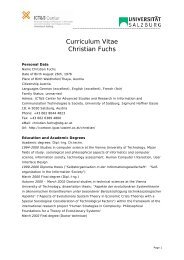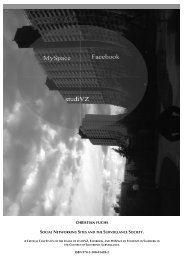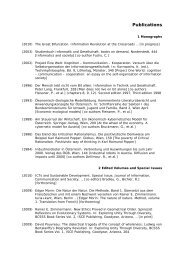ICTS AND SOCIETY: THE SALZBURG APPROACH - ICT&S
ICTS AND SOCIETY: THE SALZBURG APPROACH - ICT&S
ICTS AND SOCIETY: THE SALZBURG APPROACH - ICT&S
Create successful ePaper yourself
Turn your PDF publications into a flip-book with our unique Google optimized e-Paper software.
ICTs and Society: The Salzburg Approach<br />
Sciences with the words: “The law and the event remain to exist alongside one another<br />
as the final, incommensurable forms of our notions about the world” (Windelband<br />
1894, translated by Mos 1998). Also in the 1880ies T.H. Huxley and Matthew<br />
Arnold had a controversy about the relation between scientists and literary intellectuals.<br />
For T.H. Huxley, a biologist who taught Darwinian Evolution Theory, the natural<br />
sciences were more important than any other discipline within the arts and humanities<br />
because for him culture was nothing but nature. In his lecture ”Science<br />
and Culture“ T.H. Huxley said: “Mr. Arnold tells us that the meaning of culture is ‘to<br />
know the best that has been thought and said in the world.’ [... But...] culture certainly<br />
means something quite different from learning or technical skill“ (Huxley 1880,<br />
online). Matthew Arnold, one of the leading literates and intellectuals in Victorian<br />
England, was convinced that culture means something else than nature. For him it<br />
was more important to have at least some knowledge of Greek, Roman, and Eastern<br />
Antiquity (see Arnold 1882, online).<br />
In the late 1950ies Snow reflected the Two Cultures in science. For him it was<br />
dangerous to have two cultures, which are not able or willing to communicate. “In a<br />
time when science is determining much of our destiny [...] it is dangerous in the<br />
most practical terms. Scientists can give bad advice and decision-makers can’t know<br />
whether it is good or bad” (Snow 1998a, 98). The solution to such a dangerous<br />
distinctions should be a “third culture”, as Snow pointed out in his second essay<br />
“The Two Cultures: A Second Look”, which was published in 1963. Snow’s second<br />
essay ends with the words: ”With good fortune, however, we can educate a large<br />
proportion of our better minds so that they are not ignorant of imaginative experience,<br />
both in the arts and in science, nor ignorant either of the endowments of<br />
applied science, of the remediable suffering of most of their fellow humans, and of<br />
the responsibilities which, once they are seen, cannot be denied” (Snow 1998b,<br />
100).<br />
The notion of the Third Culture is very popular in today’s scientific world. John<br />
Brockman, a US-American publisher and author, used this term as the title of his<br />
anthology ”The Third Culture – Beyond the Scientific Revolution“ (1995), in which he<br />
refers to Snow’s Third Culture: ”Although I borrow Snow’s phrase, it does not describe<br />
the third culture he predicted“ (Brockman 1995, 18). Whereas Snow demanded<br />
a culture in which scientists and literary intellectuals were able and willing<br />
to communicate with each other, Brockman’s “third-culture thinkers are the new<br />
public intellectuals“, who are ”communicating their thoughts to the public and to<br />
one another“ (Brockman 1995, 18 and 20). The Third Culture is according to<br />
Brockman ”founded on the realization of the import of complexity, of evolution.<br />
Very complex systems – whether organisms, brains, the biosphere, or the universe<br />
itself – were not constructed by design: all have evolved“ (Brockman 1995, 20-21).<br />
Brockman’s attempt is not sufficient for the concept of an emerging Third Culture,<br />
as he is only referring to “scientists and other thinkers in the empirical world“<br />
(Brockman 1995, 19). He fosters the distinction between the natural sciences and<br />
the humanities by only considering sciences that employ analytical and empirical<br />
methods.<br />
For some researchers the Third Culture means disciplines that cannot be classified<br />
as either belonging to the natural science or to the humanities. E.g. Wolf Lepenies<br />
(2002) argues in such a way; he sees sociology as a mediating science, the social<br />
Hofkirchner | Fuchs | Raffl | Schafranek | Sandoval | Bichler 8









